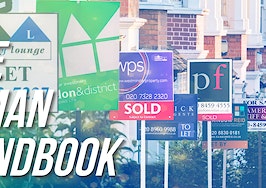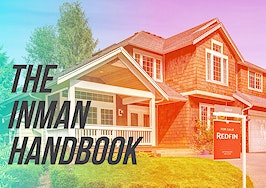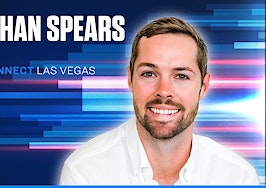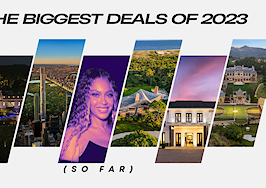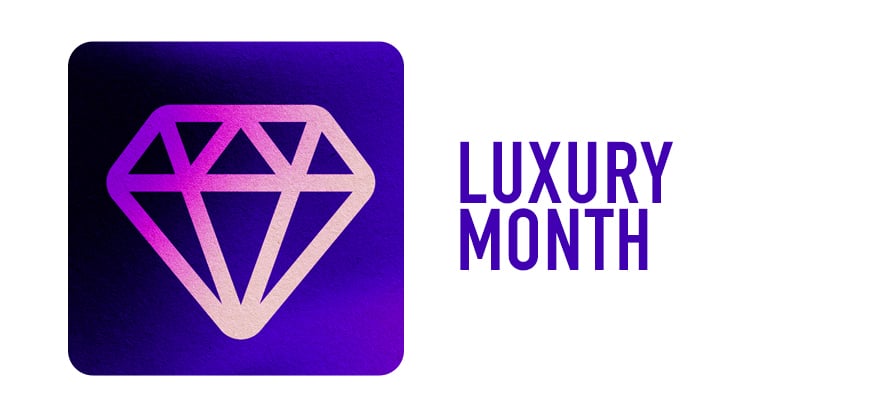 October is Luxury Month on Inman. Inman Handbooks offer deep dives on luxury marketing and agent branding, luxury staging, referrals, and more. We’re thinking about what luxury means now, examining how the pandemic is reshaping the needs of luxury buyers, and talking to top luxury agents, all month long.
October is Luxury Month on Inman. Inman Handbooks offer deep dives on luxury marketing and agent branding, luxury staging, referrals, and more. We’re thinking about what luxury means now, examining how the pandemic is reshaping the needs of luxury buyers, and talking to top luxury agents, all month long.
Michael Daly began his career as a real estate agent in 1998 without knowing how to find any listings. So an older agent in his Long Island, New York, office told him to pull up to her desk.

Michael Daly
“She said, you can look up all the houses between $200,000 and $300,000 and just start calling the owners,” Daly recently told Inman.
That made sense. But then Daily had an idea.
“I said, ‘How about we look up the owners of $2 million and $3 million houses. Let’s just add a zero to it,'” he recalled. “She said, ‘Oh, we don’t sell any of those here.’ And I said, ‘Maybe it’s time we start.'”
More than two decades later, Daly — who today is with Douglas Elliman — has hustled his way to a successful real estate career doing both high-end transactions and coaching agents with similar dreams. But that first conversation also captures something many agents experience: the ambition to do higher end transactions coupled with a lack of knowledge about how to actually find them.
It’s an ambition that makes sense. The commissions are obviously fatter at the higher end of the spectrum, and agents who spoke to Inman for this story also said they found the properties more interesting and the challenges more intriguing in the luxury niche.
This year, luxury real estate has also seen massive growth. According to data the National Association of Realtors (NAR) provided to Inman, year-over-year sales growth of homes costing $1 million or more outpaced growth at every other price range in every region of the U.S. in August. In the South, which saw the most luxury growth, sales jumped a whopping 63.1 percent compared to last year.
Across the entire U.S., luxury sales were up 44 percent year-over-year in August. Which is to say, other challenges notwithstanding, this is a growth period for getting into high end real estate.
But the data also highlights challenges. Though sales of luxury properties are up, NAR’s numbers also show that those sales remain a relatively small slice of the real estate pie. In the South, for example, luxury sales represented 2.2 percent of the market. The numbers jump up to 11 percent in the West, but across the U.S. million-dollar homes only comprised 4.1 percent of total sales in August.
That means luxury is a niche, and niches are by their very nature competitive. They can be hard to break into, and hard to thrive in long term. With that in mind, Inman reached out to agents across the U.S. to figure out how they managed to break into luxury real estate.
Their paths were all different, but invariably they all agreed they managed to do it through a combination of hard work and smart work. Here’s what they had to say.
Table of Contents
- Build up to luxury over time
- Be in the right place at the right time
- Partner with experienced leaders
- Get the branding right
Build up to luxury over time
Pete Bellande, a RE/MAX broker in the Denver area, began his real estate career about seven years ago. And at the time, he was working with a lot of first-time homebuyers, whose purchases tended to be on the more affordable end of the spectrum. But over time, these same buyer started to have kids and growing families. Then they started needing bigger houses.

Pete Bellande
“That’s kind of how it organically happened for me,” Bellande recently told Inman of his transition to higher-end deals. “That $300,000 first purchase becomes a $800,000 third purchase.”
This process doesn’t happen accidentally, and it’s well-documented that many homebuyers don’t return to their agents for repeat business. But Bellande said that over the years he’s remained friends with his clients. He gets invited to parties and weddings. He goes on trips with clients. And he makes sure to be an organic, in-person presence for them — which has ultimately helped him earn the repeat business that pushed him to higher end listings.
Gradual building was a recurring idea that came up in a number of conversations for this story. Gill Chowdhury, for example, told Inman he started “out at the very bottom of the totem pole, probably as low as you can go.”

Gill Chowdhury
In his case, that meant that a decade ago he was “flipping cold leads” and renting out studio apartments in Manhattan while working for Citi Habitats. But Chowdhury eventually started buying leads from Zillow, which allowed him to gradually break into sales.
Now, he’s an agent with Warburg Realty, where he has “shifted more and more focus toward higher price points.” However, Chowdhury also emphasized that the process of breaking into luxury tends to take some time.
“Nine years,” he replied when asked how long agents might have to work to truly gain a footing in the luxury world.
And of course there’s Daly’s experience. He said that after that initial conversation in his office, it took him about two weeks to score his first open house. (In those days many listings in the area were “open,” Daly said, meaning any agent could approach homeowners about holding open houses). Months later, his mentor helped him score his first deal, for a $3 million home. And seven years after that, Daly was managing the office.
Timelines will certainly vary depending on the market and the agent, but the fact remains that many people working in luxury real estate today got there by starting with lower-value transactions and stepping up little by little over many years.

Additional resources:
- The Essential Guide to the New Luxury Real Estate Market
- 6 tips for standing out as a luxury real estate agent
- How the coronavirus pandemic is reshuffling the luxury real estate market
- Luxury real estate is ‘outpacing the broader market’ in some areas
- Luxury market shows signs of recovery as home prices rise
- These are the 2 things luxury buyers want right now
- Luxury snapshot: Housing markets will thrive after pandemic setbacks
Be in the right place at the right time
So how does an agent gradually build up to luxury?
One way, according to the agents who spoke with Inman, is to make sure you’re in the right place at the right time.
Take Bellande for example. He said that just days ago, he was running an errand in Golden, a suburb of Denver, and decided to stop by one of his favorite breweries. He had his dog Max, a Jack Russell blue heeler mix, who soon found another dog at the brewery to socialize with.
Bellande said his dog opened the door for him to talk to the other dog owners. Soon, they mentioned they wanted “to buy some acreage and it sounds like a sizable purchase.”
“That happened a few days ago,” he added, “and now we’re having a buyer consult.”
There’s a certain amount of luck involved in this strategy, but Bellande described himself as an extrovert who makes a habit of putting himself out there. The result is that while every errand may not result in a new lead, the law of averages suggests that over time he’ll gradually meet more people, some of whom will be new clients.
Indeed, luck doesn’t actually have to be a significant factor. Bellande encouraged would-be luxury agents to “get a hobby and meet people that way,” and to make sure they’re socializing in the same places that their target clients congregate.
“I would say to get involved in communities of people that are going to be filled with those sorts of buyers and sellers you want,” he added.

Micheal J. Franco
Michael J. Franco has also gone to great lengths to make sure he was physically in the spaces that would help him break into luxury. Like other agents who spoke with Inman, Franco didn’t start out in luxury with powerful connections or a vast network. So instead, he “would block off time every day to go preview properties.”
“And I started previewing as many higher end properties as I could,” he said.
Previewing those properties exposed Franco to the areas and brokers he would eventually encounter as he forged his own luxury-oriented career — he’s with Compass and based in Manhattan — and allowed him to speak authoritatively about different properties and neighborhoods. In other words, it helped build both a network and his mental archive of luxury-oriented information.

Cary Perkins
Cary Perkins, a Windermere agent in Portland, Oregon, said that in her area, agents can also participate in industry events that expose them to real estate best practices, as well as things like art and high-end insurance that their luxury clients may need to know about.
These kinds of offerings will differ depending on the area. But whatever they specifically look like, the goal for agents looking to move into luxury is to maximize exposure to the world that luxury real estate consumers inhabit. It’s all about understanding the network, knowledge and mindset of would-be clients.
“Participating in anything like that is really helpful,” Perkins added.

Additional resources:
- How to build a network as a real estate agent in a brand new area
- Real estate networking tips to keep close in 2020
- How to snag luxury clients who’ll make you millions
- Who’s your target audience? 5 key groups to focus on
- Real estate at 10,000 feet? For luxury agents, helicopters allow work to continue
Partner with experienced leaders
There are also things agents can do in the here and now to get started. Jason Mandel’s experience epitomizes that.

Jason Mandel
Mandel got started in real estate in 2006, after watching an episode of Million Dollar Listing about a high-end home in Malibu, California.
“It was probably 9 p.m. on Sunday,” Mandel, who works in the Washington, D.C., area recalled of watching the episode. “By 8 a.m. the next morning I was in real estate school with the intent to get into luxury real estate.”
But Mandel faced a serious obstacle: He didn’t have a network of wealthy friends and family from which to build a new client base. So instead, he chose his brokerage with extra care.
“I had the option of selecting an office closer to where I lived,” he told Inman. “But I intentionally selected an office that was located in one of these luxury communities. The office I selected had the largest market share of these luxury properties.”
Choosing an office in the physical location where he wanted to work placed Mandel in close physical proximity to the agents and consumers who would ultimately make up his professional sphere. But he also said that for agents without an established record, affiliating with the right office can be a kind of fast track to earning credibility.
“It definitely helps,” he explained. “If I’m meeting with a prospective seller, they want to know the track record of the brand that is going to be representing that asset.”
Mandel had similar success with a mentor who had extensive experience with luxury. As a newer agent, he found an experienced colleague and offered to help her in whatever way he could. The work wasn’t initially glamorous — his first task was putting up open house signs — but the relationship eventually became quite fruitful.
“Eventually I was cohosting the open houses with her, then going on active listing presentations with her,” he recalled. “We became a full partnership. We were both recruited into a luxury firm.”
Mandel added that his mentor relationship blossomed because he found someone who wouldn’t see him as a potential threat or competitor, and with whom he could have a mutually beneficial relationship.
Breaking into luxury still takes time, but Mandel — who today is with Washington Fine Properties — said a good first step for agents hoping to break into luxury is choosing the right people to associate with.
Daly made a similar point, arguing that “mentorship and working on a team or with a partner will accelerate a person’s growth in the business.”
“I think it behooves people to come in as part of a team, and be mentored at least for their first six months to a year to kind of get themselves grounded and be involved in some transactions,” he said. “To have a buddy to shadow them, to support them, to help them handle the business that they’re going to bring to the table.”
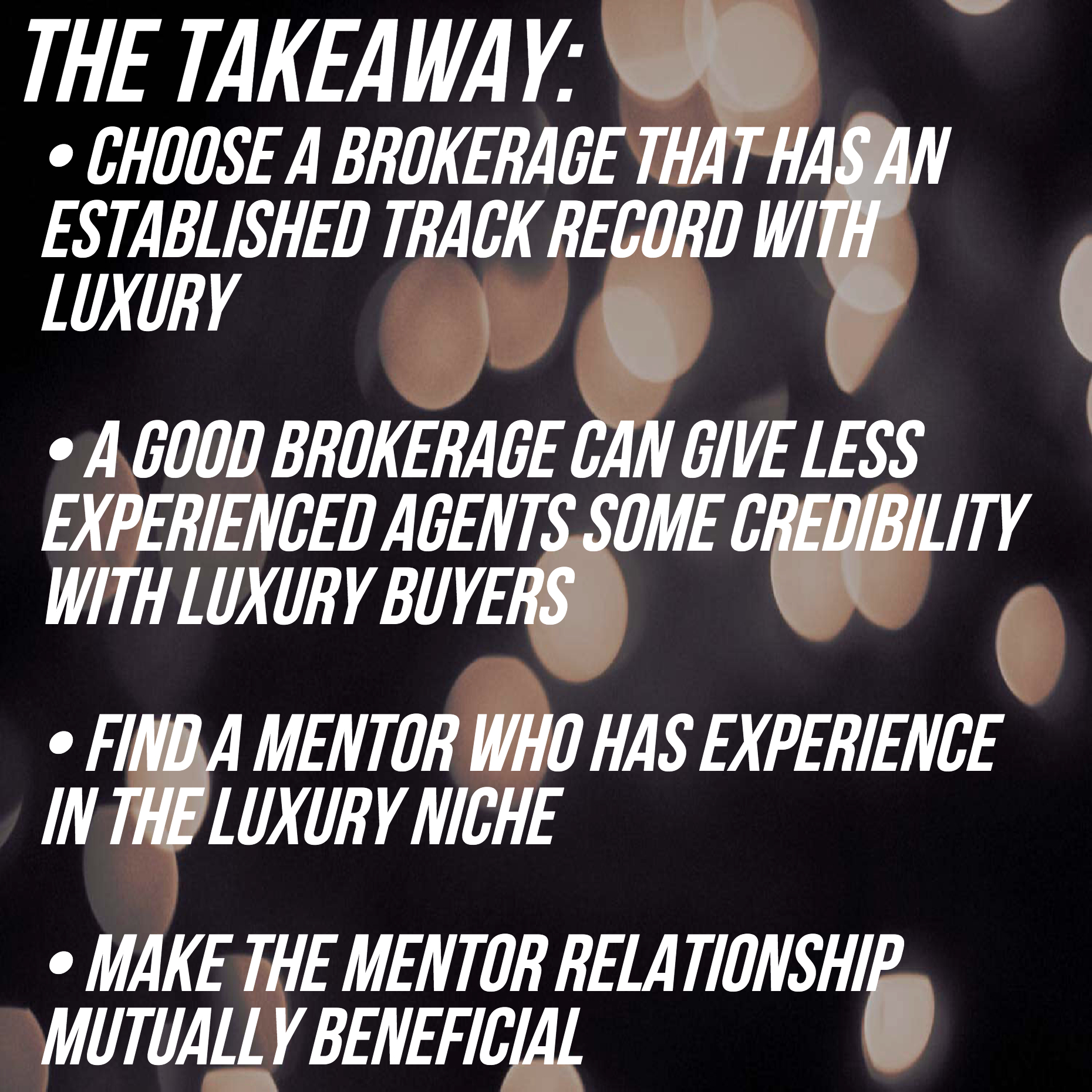
Additional resources:
- 3 facets to consider when choosing your luxury brokerage
- How to select the right real estate brokerage
- What to look for when you’re choosing a brokerage
- Inman Handbook: Finding a coach and making breakthroughs
- The real estate agent living his best life as husband, mentor and mensch
- Searching for a mentor? Look for these 11 qualities
Get the branding right
When Perkins started in real estate more than two decades ago, she built a brand around her personality. She said the brand had a “cute” aesthetic and, in a nod to one of her favorite things, featured an image of her eating a donut.
It was an effective brand for what it was, and Perkins liked it. But gradually, she came to a realization.
“Even though people loved it and it really catapulted me to a much higher level,” she said, “eating a donut probably is not the route to developing more luxury business.”
So Perkins adapted. In place of the bright colors and donut imagery, Perkins rolled out a darker color scheme with a floral motif. She upgraded her website and worked to make all of her visuals more “sophisticated.” And in place of the the slogan “fun with real estate” she debuted the tagline “Fine Portland real estate.”
Perkins said that before her rebranding, she was doing roughly one million-dollar deal a year. But afterward, it didn’t take long for that to change.
“I would say it took less than one year,” she said. “I had numerous million-plus sales.”
Perkins also said that branding doesn’t have to cost much. Most communities have someone who can help agents with their brand for less than $2,000, and graphic designers are available out there to do work on logos for even less.
Perhaps more importantly still, though, she said agents need to “spend some time alone in a quiet room early in the morning when there’s nothing else on your brain and think about what kind of people do you want to work with.” Everything in an agent’s branding should be about those people, not necessarily about the agents themselves.
Branding of course isn’t everything when it comes to breaking into luxury. But the agents who spoke to Inman did say that industry members ultimately need to project an image of competence and confidence if they want to attract buyers at the upper end of the price spectrum.
“I just believe that a strong brand and a well thought out brand,” Perkins said, “is so important.”

Additional resources:
- The Essential Guide to Luxury Marketing
- Inman Handbook: Branding your way to success
- Goodbye sports cars, hello restraint: Luxury marketing flips the script
- Independent success: How I started as a luxury brand
- 5 unique marketing features that luxury brands nail
- Coldwell Banker unveils new global luxury rebranding
- The 7 do’s and don’ts of becoming a marketing powerhouse



